International Business Report: Challenges in Nigeria's Trade
VerifiedAdded on 2022/12/30
|11
|3827
|86
Report
AI Summary
This report provides a comprehensive analysis of Nigeria's international business, focusing on its trade relations with neighboring countries, specifically Benin and Chad. It begins by defining international business and then delves into the challenges, barriers, and competition Nigeria faces in its trade activities. These challenges include corruption, foreign trade restrictions, lack of infrastructure, and inconsistencies in supply and demand. The report also examines the barriers such as border closures, ethnic cultural differences, trade policies, and low per capita income that hinder Nigeria's trade. Furthermore, the report explores the competition Nigeria faces within the regional trading bloc, including import and export dynamics, trade volume, economic growth, and resource optimization. The report concludes by analyzing the steps and initiatives Nigeria has undertaken to overcome these challenges and improve its international trade performance. The report references various academic sources to support its findings and analysis.
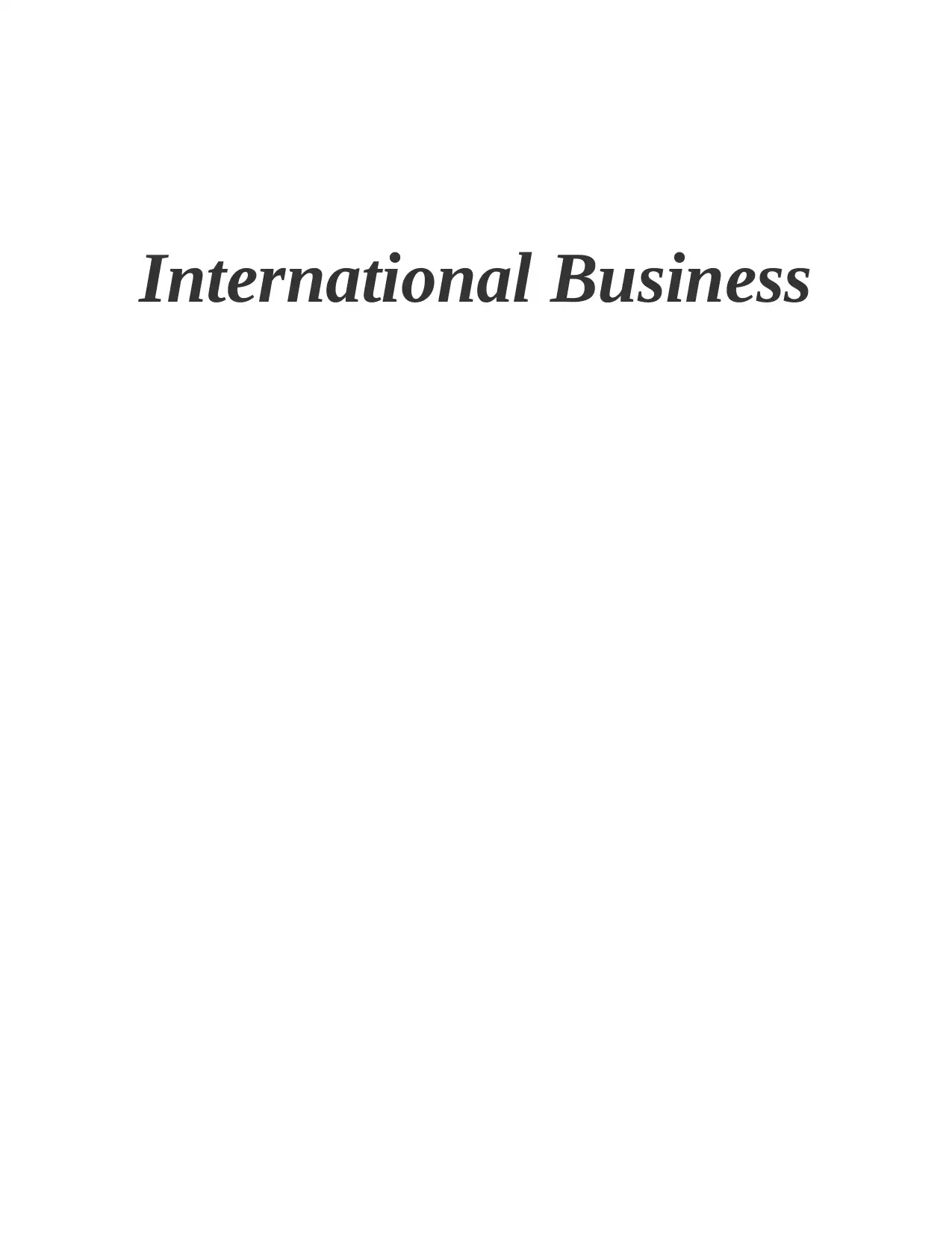
International Business
Paraphrase This Document
Need a fresh take? Get an instant paraphrase of this document with our AI Paraphraser
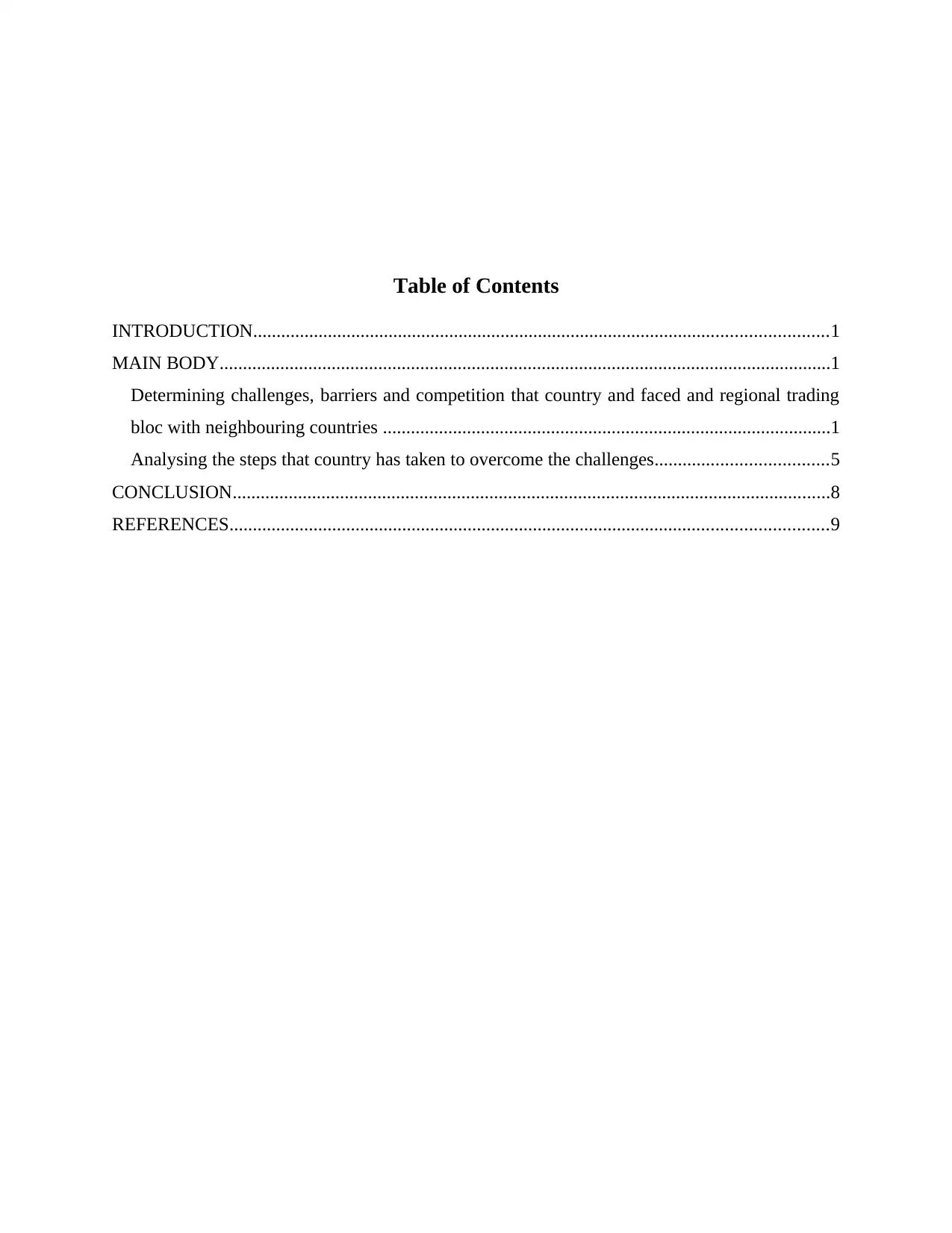
Table of Contents
INTRODUCTION...........................................................................................................................1
MAIN BODY...................................................................................................................................1
Determining challenges, barriers and competition that country and faced and regional trading
bloc with neighbouring countries ................................................................................................1
Analysing the steps that country has taken to overcome the challenges.....................................5
CONCLUSION................................................................................................................................8
REFERENCES................................................................................................................................9
INTRODUCTION...........................................................................................................................1
MAIN BODY...................................................................................................................................1
Determining challenges, barriers and competition that country and faced and regional trading
bloc with neighbouring countries ................................................................................................1
Analysing the steps that country has taken to overcome the challenges.....................................5
CONCLUSION................................................................................................................................8
REFERENCES................................................................................................................................9
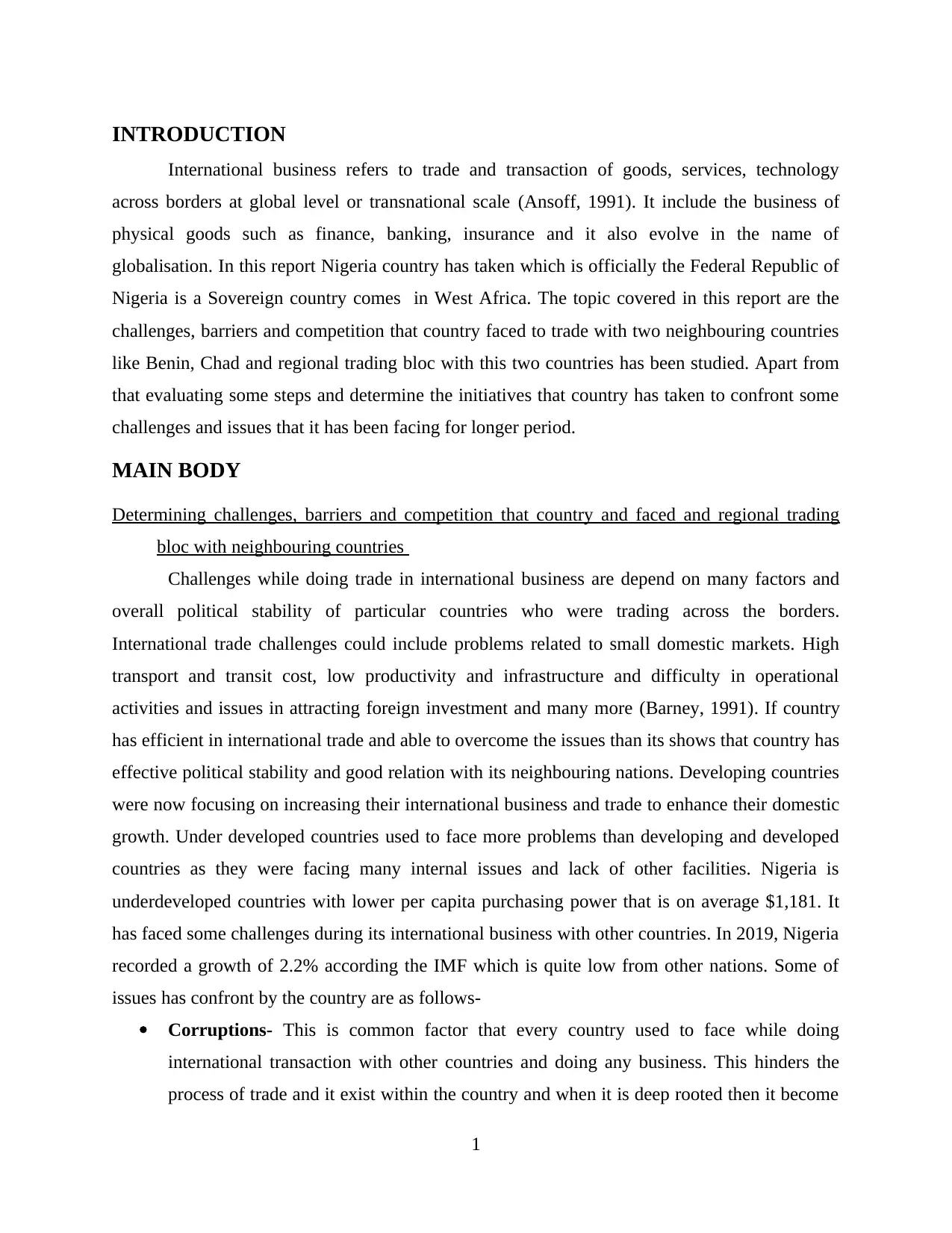
INTRODUCTION
International business refers to trade and transaction of goods, services, technology
across borders at global level or transnational scale (Ansoff, 1991). It include the business of
physical goods such as finance, banking, insurance and it also evolve in the name of
globalisation. In this report Nigeria country has taken which is officially the Federal Republic of
Nigeria is a Sovereign country comes in West Africa. The topic covered in this report are the
challenges, barriers and competition that country faced to trade with two neighbouring countries
like Benin, Chad and regional trading bloc with this two countries has been studied. Apart from
that evaluating some steps and determine the initiatives that country has taken to confront some
challenges and issues that it has been facing for longer period.
MAIN BODY
Determining challenges, barriers and competition that country and faced and regional trading
bloc with neighbouring countries
Challenges while doing trade in international business are depend on many factors and
overall political stability of particular countries who were trading across the borders.
International trade challenges could include problems related to small domestic markets. High
transport and transit cost, low productivity and infrastructure and difficulty in operational
activities and issues in attracting foreign investment and many more (Barney, 1991). If country
has efficient in international trade and able to overcome the issues than its shows that country has
effective political stability and good relation with its neighbouring nations. Developing countries
were now focusing on increasing their international business and trade to enhance their domestic
growth. Under developed countries used to face more problems than developing and developed
countries as they were facing many internal issues and lack of other facilities. Nigeria is
underdeveloped countries with lower per capita purchasing power that is on average $1,181. It
has faced some challenges during its international business with other countries. In 2019, Nigeria
recorded a growth of 2.2% according the IMF which is quite low from other nations. Some of
issues has confront by the country are as follows-
Corruptions- This is common factor that every country used to face while doing
international transaction with other countries and doing any business. This hinders the
process of trade and it exist within the country and when it is deep rooted then it become
1
International business refers to trade and transaction of goods, services, technology
across borders at global level or transnational scale (Ansoff, 1991). It include the business of
physical goods such as finance, banking, insurance and it also evolve in the name of
globalisation. In this report Nigeria country has taken which is officially the Federal Republic of
Nigeria is a Sovereign country comes in West Africa. The topic covered in this report are the
challenges, barriers and competition that country faced to trade with two neighbouring countries
like Benin, Chad and regional trading bloc with this two countries has been studied. Apart from
that evaluating some steps and determine the initiatives that country has taken to confront some
challenges and issues that it has been facing for longer period.
MAIN BODY
Determining challenges, barriers and competition that country and faced and regional trading
bloc with neighbouring countries
Challenges while doing trade in international business are depend on many factors and
overall political stability of particular countries who were trading across the borders.
International trade challenges could include problems related to small domestic markets. High
transport and transit cost, low productivity and infrastructure and difficulty in operational
activities and issues in attracting foreign investment and many more (Barney, 1991). If country
has efficient in international trade and able to overcome the issues than its shows that country has
effective political stability and good relation with its neighbouring nations. Developing countries
were now focusing on increasing their international business and trade to enhance their domestic
growth. Under developed countries used to face more problems than developing and developed
countries as they were facing many internal issues and lack of other facilities. Nigeria is
underdeveloped countries with lower per capita purchasing power that is on average $1,181. It
has faced some challenges during its international business with other countries. In 2019, Nigeria
recorded a growth of 2.2% according the IMF which is quite low from other nations. Some of
issues has confront by the country are as follows-
Corruptions- This is common factor that every country used to face while doing
international transaction with other countries and doing any business. This hinders the
process of trade and it exist within the country and when it is deep rooted then it become
1
⊘ This is a preview!⊘
Do you want full access?
Subscribe today to unlock all pages.

Trusted by 1+ million students worldwide
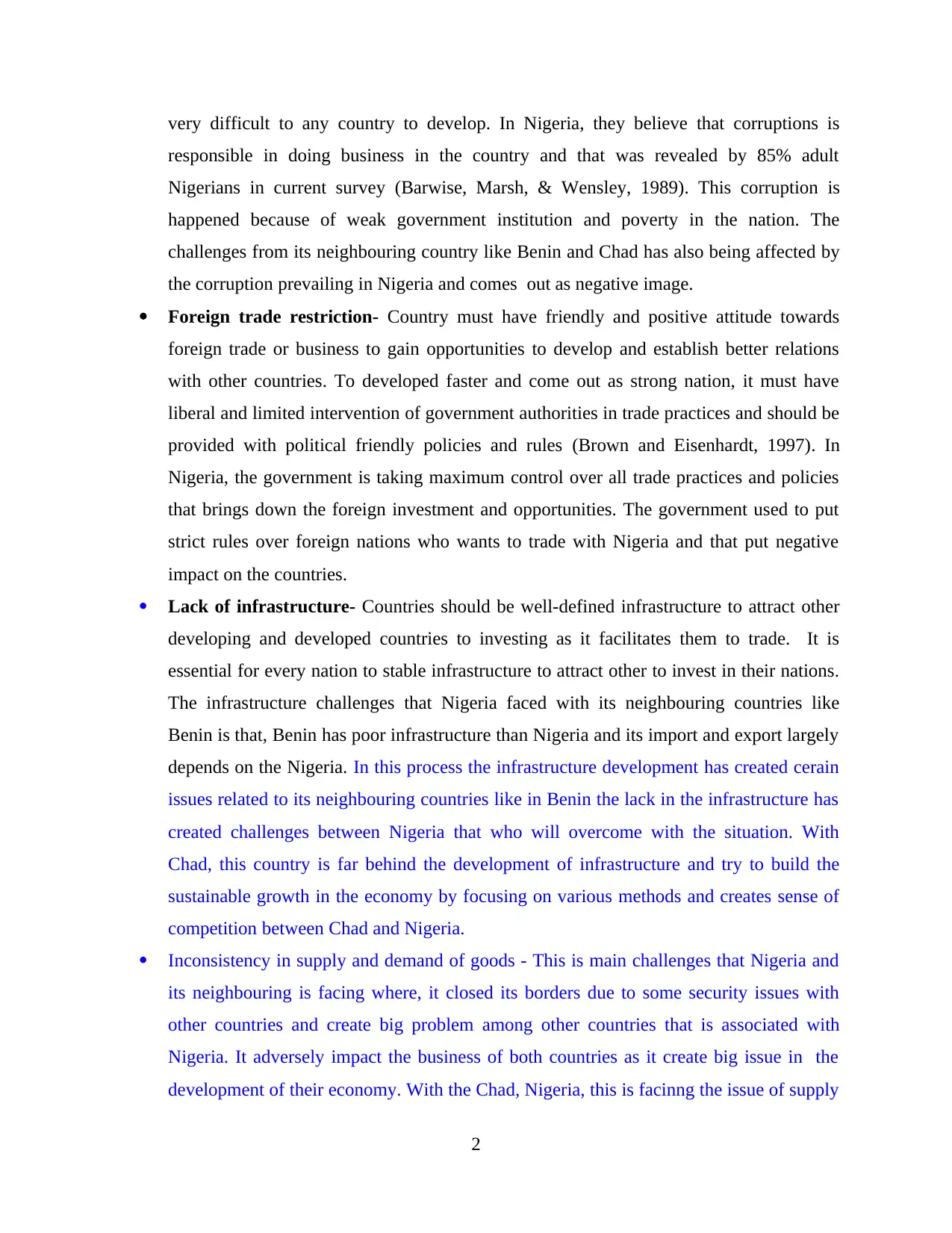
very difficult to any country to develop. In Nigeria, they believe that corruptions is
responsible in doing business in the country and that was revealed by 85% adult
Nigerians in current survey (Barwise, Marsh, & Wensley, 1989). This corruption is
happened because of weak government institution and poverty in the nation. The
challenges from its neighbouring country like Benin and Chad has also being affected by
the corruption prevailing in Nigeria and comes out as negative image.
Foreign trade restriction- Country must have friendly and positive attitude towards
foreign trade or business to gain opportunities to develop and establish better relations
with other countries. To developed faster and come out as strong nation, it must have
liberal and limited intervention of government authorities in trade practices and should be
provided with political friendly policies and rules (Brown and Eisenhardt, 1997). In
Nigeria, the government is taking maximum control over all trade practices and policies
that brings down the foreign investment and opportunities. The government used to put
strict rules over foreign nations who wants to trade with Nigeria and that put negative
impact on the countries.
Lack of infrastructure- Countries should be well-defined infrastructure to attract other
developing and developed countries to investing as it facilitates them to trade. It is
essential for every nation to stable infrastructure to attract other to invest in their nations.
The infrastructure challenges that Nigeria faced with its neighbouring countries like
Benin is that, Benin has poor infrastructure than Nigeria and its import and export largely
depends on the Nigeria. In this process the infrastructure development has created cerain
issues related to its neighbouring countries like in Benin the lack in the infrastructure has
created challenges between Nigeria that who will overcome with the situation. With
Chad, this country is far behind the development of infrastructure and try to build the
sustainable growth in the economy by focusing on various methods and creates sense of
competition between Chad and Nigeria.
Inconsistency in supply and demand of goods - This is main challenges that Nigeria and
its neighbouring is facing where, it closed its borders due to some security issues with
other countries and create big problem among other countries that is associated with
Nigeria. It adversely impact the business of both countries as it create big issue in the
development of their economy. With the Chad, Nigeria, this is facinng the issue of supply
2
responsible in doing business in the country and that was revealed by 85% adult
Nigerians in current survey (Barwise, Marsh, & Wensley, 1989). This corruption is
happened because of weak government institution and poverty in the nation. The
challenges from its neighbouring country like Benin and Chad has also being affected by
the corruption prevailing in Nigeria and comes out as negative image.
Foreign trade restriction- Country must have friendly and positive attitude towards
foreign trade or business to gain opportunities to develop and establish better relations
with other countries. To developed faster and come out as strong nation, it must have
liberal and limited intervention of government authorities in trade practices and should be
provided with political friendly policies and rules (Brown and Eisenhardt, 1997). In
Nigeria, the government is taking maximum control over all trade practices and policies
that brings down the foreign investment and opportunities. The government used to put
strict rules over foreign nations who wants to trade with Nigeria and that put negative
impact on the countries.
Lack of infrastructure- Countries should be well-defined infrastructure to attract other
developing and developed countries to investing as it facilitates them to trade. It is
essential for every nation to stable infrastructure to attract other to invest in their nations.
The infrastructure challenges that Nigeria faced with its neighbouring countries like
Benin is that, Benin has poor infrastructure than Nigeria and its import and export largely
depends on the Nigeria. In this process the infrastructure development has created cerain
issues related to its neighbouring countries like in Benin the lack in the infrastructure has
created challenges between Nigeria that who will overcome with the situation. With
Chad, this country is far behind the development of infrastructure and try to build the
sustainable growth in the economy by focusing on various methods and creates sense of
competition between Chad and Nigeria.
Inconsistency in supply and demand of goods - This is main challenges that Nigeria and
its neighbouring is facing where, it closed its borders due to some security issues with
other countries and create big problem among other countries that is associated with
Nigeria. It adversely impact the business of both countries as it create big issue in the
development of their economy. With the Chad, Nigeria, this is facinng the issue of supply
2
Paraphrase This Document
Need a fresh take? Get an instant paraphrase of this document with our AI Paraphraser
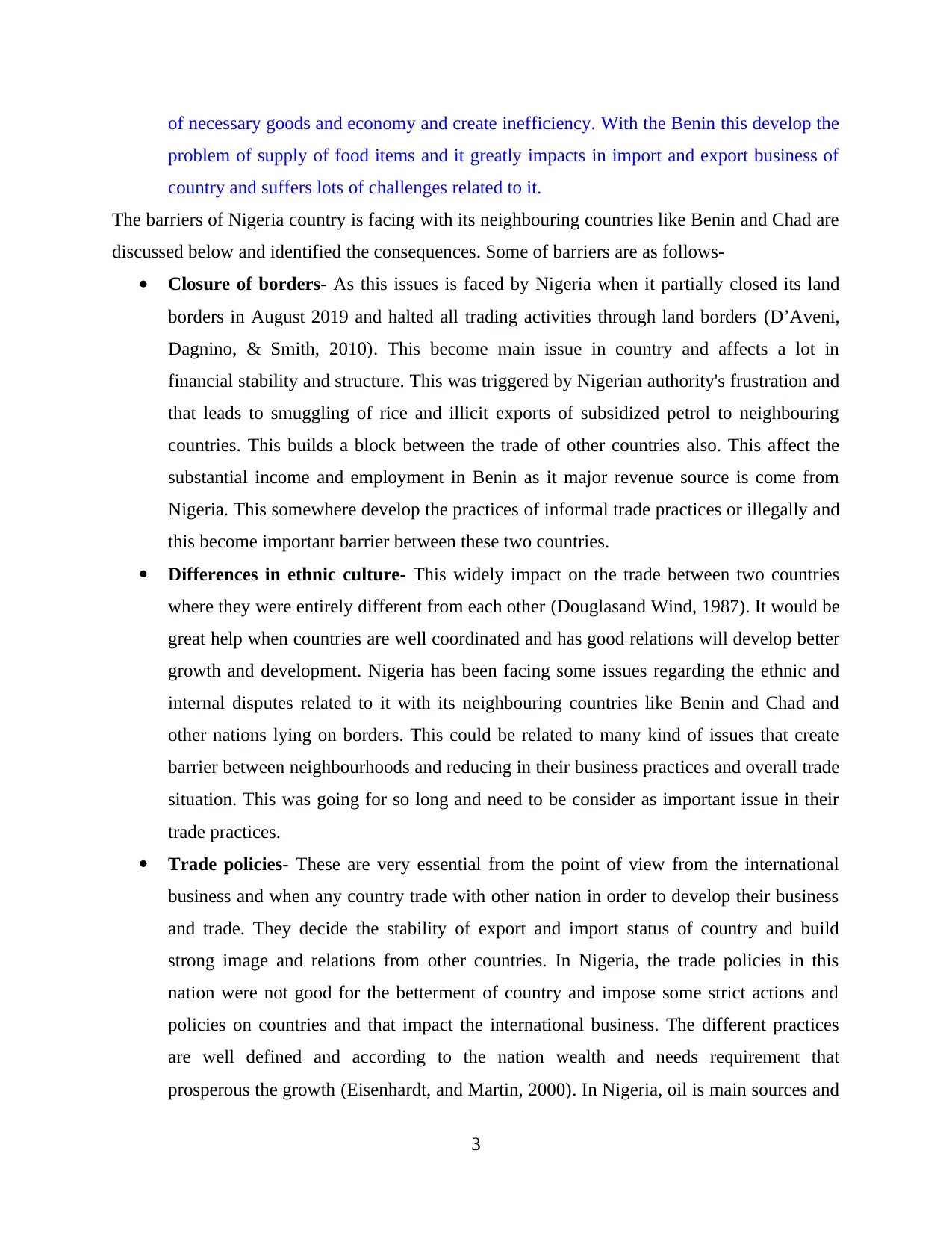
of necessary goods and economy and create inefficiency. With the Benin this develop the
problem of supply of food items and it greatly impacts in import and export business of
country and suffers lots of challenges related to it.
The barriers of Nigeria country is facing with its neighbouring countries like Benin and Chad are
discussed below and identified the consequences. Some of barriers are as follows-
Closure of borders- As this issues is faced by Nigeria when it partially closed its land
borders in August 2019 and halted all trading activities through land borders (D’Aveni,
Dagnino, & Smith, 2010). This become main issue in country and affects a lot in
financial stability and structure. This was triggered by Nigerian authority's frustration and
that leads to smuggling of rice and illicit exports of subsidized petrol to neighbouring
countries. This builds a block between the trade of other countries also. This affect the
substantial income and employment in Benin as it major revenue source is come from
Nigeria. This somewhere develop the practices of informal trade practices or illegally and
this become important barrier between these two countries.
Differences in ethnic culture- This widely impact on the trade between two countries
where they were entirely different from each other (Douglasand Wind, 1987). It would be
great help when countries are well coordinated and has good relations will develop better
growth and development. Nigeria has been facing some issues regarding the ethnic and
internal disputes related to it with its neighbouring countries like Benin and Chad and
other nations lying on borders. This could be related to many kind of issues that create
barrier between neighbourhoods and reducing in their business practices and overall trade
situation. This was going for so long and need to be consider as important issue in their
trade practices.
Trade policies- These are very essential from the point of view from the international
business and when any country trade with other nation in order to develop their business
and trade. They decide the stability of export and import status of country and build
strong image and relations from other countries. In Nigeria, the trade policies in this
nation were not good for the betterment of country and impose some strict actions and
policies on countries and that impact the international business. The different practices
are well defined and according to the nation wealth and needs requirement that
prosperous the growth (Eisenhardt, and Martin, 2000). In Nigeria, oil is main sources and
3
problem of supply of food items and it greatly impacts in import and export business of
country and suffers lots of challenges related to it.
The barriers of Nigeria country is facing with its neighbouring countries like Benin and Chad are
discussed below and identified the consequences. Some of barriers are as follows-
Closure of borders- As this issues is faced by Nigeria when it partially closed its land
borders in August 2019 and halted all trading activities through land borders (D’Aveni,
Dagnino, & Smith, 2010). This become main issue in country and affects a lot in
financial stability and structure. This was triggered by Nigerian authority's frustration and
that leads to smuggling of rice and illicit exports of subsidized petrol to neighbouring
countries. This builds a block between the trade of other countries also. This affect the
substantial income and employment in Benin as it major revenue source is come from
Nigeria. This somewhere develop the practices of informal trade practices or illegally and
this become important barrier between these two countries.
Differences in ethnic culture- This widely impact on the trade between two countries
where they were entirely different from each other (Douglasand Wind, 1987). It would be
great help when countries are well coordinated and has good relations will develop better
growth and development. Nigeria has been facing some issues regarding the ethnic and
internal disputes related to it with its neighbouring countries like Benin and Chad and
other nations lying on borders. This could be related to many kind of issues that create
barrier between neighbourhoods and reducing in their business practices and overall trade
situation. This was going for so long and need to be consider as important issue in their
trade practices.
Trade policies- These are very essential from the point of view from the international
business and when any country trade with other nation in order to develop their business
and trade. They decide the stability of export and import status of country and build
strong image and relations from other countries. In Nigeria, the trade policies in this
nation were not good for the betterment of country and impose some strict actions and
policies on countries and that impact the international business. The different practices
are well defined and according to the nation wealth and needs requirement that
prosperous the growth (Eisenhardt, and Martin, 2000). In Nigeria, oil is main sources and
3
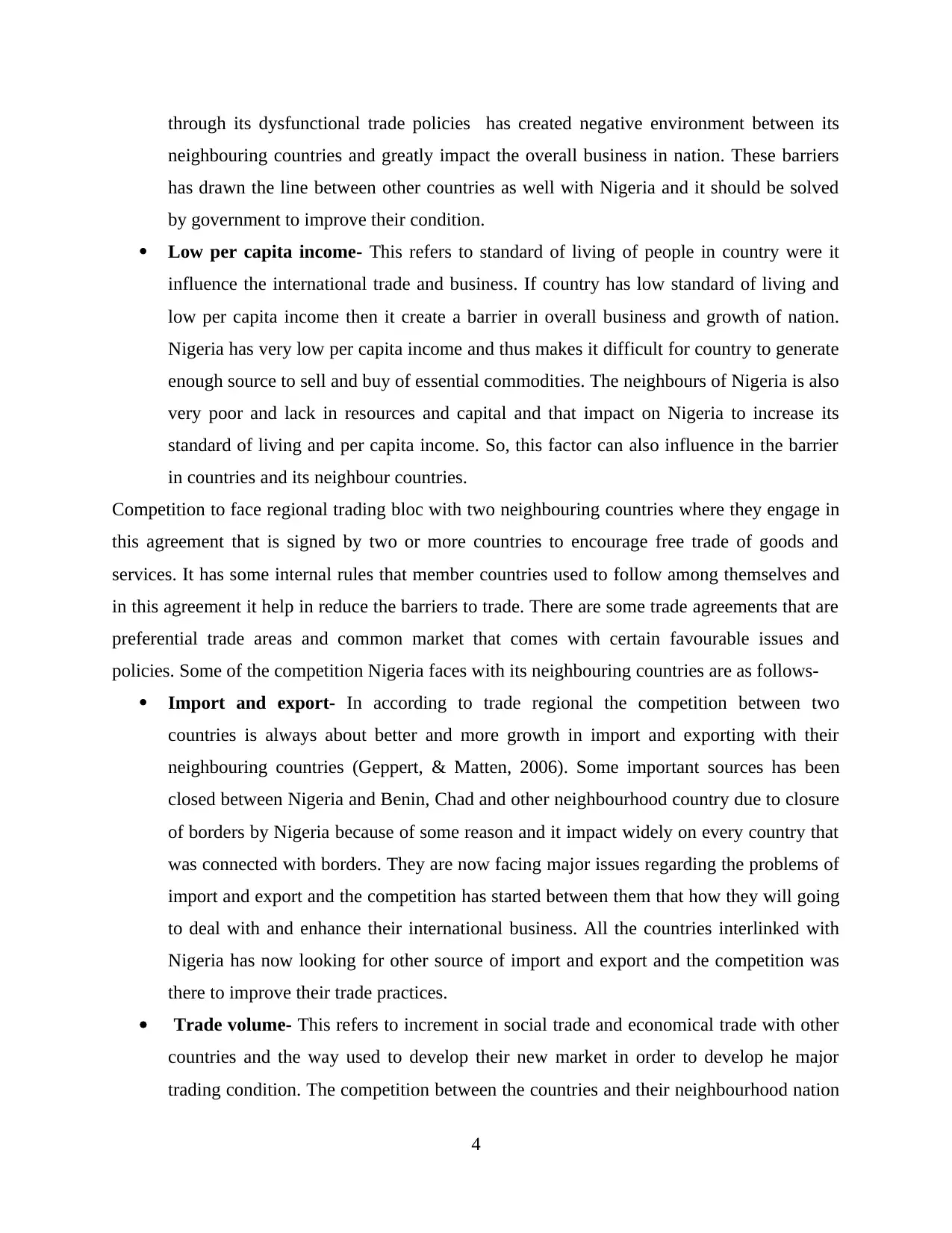
through its dysfunctional trade policies has created negative environment between its
neighbouring countries and greatly impact the overall business in nation. These barriers
has drawn the line between other countries as well with Nigeria and it should be solved
by government to improve their condition.
Low per capita income- This refers to standard of living of people in country were it
influence the international trade and business. If country has low standard of living and
low per capita income then it create a barrier in overall business and growth of nation.
Nigeria has very low per capita income and thus makes it difficult for country to generate
enough source to sell and buy of essential commodities. The neighbours of Nigeria is also
very poor and lack in resources and capital and that impact on Nigeria to increase its
standard of living and per capita income. So, this factor can also influence in the barrier
in countries and its neighbour countries.
Competition to face regional trading bloc with two neighbouring countries where they engage in
this agreement that is signed by two or more countries to encourage free trade of goods and
services. It has some internal rules that member countries used to follow among themselves and
in this agreement it help in reduce the barriers to trade. There are some trade agreements that are
preferential trade areas and common market that comes with certain favourable issues and
policies. Some of the competition Nigeria faces with its neighbouring countries are as follows-
Import and export- In according to trade regional the competition between two
countries is always about better and more growth in import and exporting with their
neighbouring countries (Geppert, & Matten, 2006). Some important sources has been
closed between Nigeria and Benin, Chad and other neighbourhood country due to closure
of borders by Nigeria because of some reason and it impact widely on every country that
was connected with borders. They are now facing major issues regarding the problems of
import and export and the competition has started between them that how they will going
to deal with and enhance their international business. All the countries interlinked with
Nigeria has now looking for other source of import and export and the competition was
there to improve their trade practices.
Trade volume- This refers to increment in social trade and economical trade with other
countries and the way used to develop their new market in order to develop he major
trading condition. The competition between the countries and their neighbourhood nation
4
neighbouring countries and greatly impact the overall business in nation. These barriers
has drawn the line between other countries as well with Nigeria and it should be solved
by government to improve their condition.
Low per capita income- This refers to standard of living of people in country were it
influence the international trade and business. If country has low standard of living and
low per capita income then it create a barrier in overall business and growth of nation.
Nigeria has very low per capita income and thus makes it difficult for country to generate
enough source to sell and buy of essential commodities. The neighbours of Nigeria is also
very poor and lack in resources and capital and that impact on Nigeria to increase its
standard of living and per capita income. So, this factor can also influence in the barrier
in countries and its neighbour countries.
Competition to face regional trading bloc with two neighbouring countries where they engage in
this agreement that is signed by two or more countries to encourage free trade of goods and
services. It has some internal rules that member countries used to follow among themselves and
in this agreement it help in reduce the barriers to trade. There are some trade agreements that are
preferential trade areas and common market that comes with certain favourable issues and
policies. Some of the competition Nigeria faces with its neighbouring countries are as follows-
Import and export- In according to trade regional the competition between two
countries is always about better and more growth in import and exporting with their
neighbouring countries (Geppert, & Matten, 2006). Some important sources has been
closed between Nigeria and Benin, Chad and other neighbourhood country due to closure
of borders by Nigeria because of some reason and it impact widely on every country that
was connected with borders. They are now facing major issues regarding the problems of
import and export and the competition has started between them that how they will going
to deal with and enhance their international business. All the countries interlinked with
Nigeria has now looking for other source of import and export and the competition was
there to improve their trade practices.
Trade volume- This refers to increment in social trade and economical trade with other
countries and the way used to develop their new market in order to develop he major
trading condition. The competition between the countries and their neighbourhood nation
4
⊘ This is a preview!⊘
Do you want full access?
Subscribe today to unlock all pages.

Trusted by 1+ million students worldwide
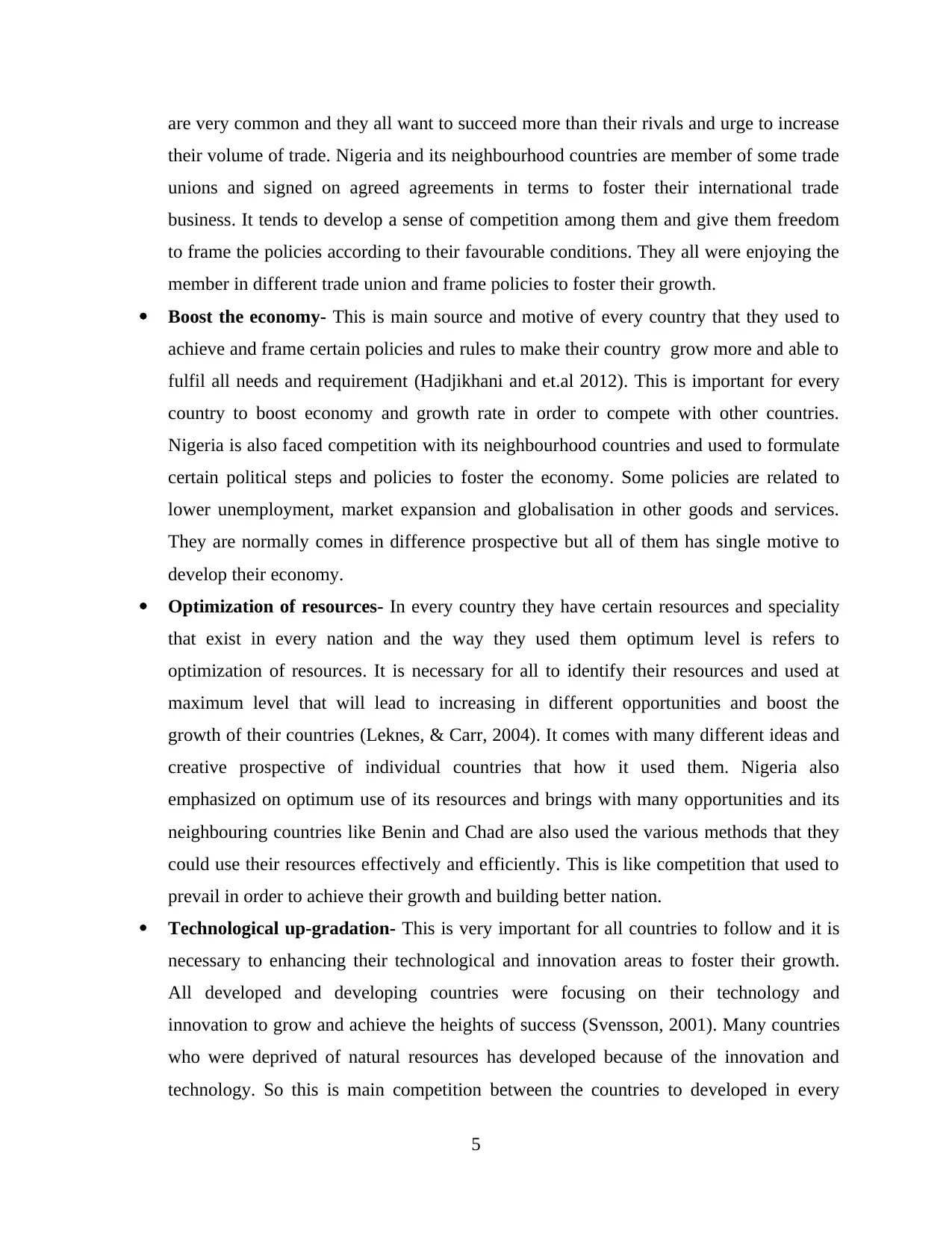
are very common and they all want to succeed more than their rivals and urge to increase
their volume of trade. Nigeria and its neighbourhood countries are member of some trade
unions and signed on agreed agreements in terms to foster their international trade
business. It tends to develop a sense of competition among them and give them freedom
to frame the policies according to their favourable conditions. They all were enjoying the
member in different trade union and frame policies to foster their growth.
Boost the economy- This is main source and motive of every country that they used to
achieve and frame certain policies and rules to make their country grow more and able to
fulfil all needs and requirement (Hadjikhani and et.al 2012). This is important for every
country to boost economy and growth rate in order to compete with other countries.
Nigeria is also faced competition with its neighbourhood countries and used to formulate
certain political steps and policies to foster the economy. Some policies are related to
lower unemployment, market expansion and globalisation in other goods and services.
They are normally comes in difference prospective but all of them has single motive to
develop their economy.
Optimization of resources- In every country they have certain resources and speciality
that exist in every nation and the way they used them optimum level is refers to
optimization of resources. It is necessary for all to identify their resources and used at
maximum level that will lead to increasing in different opportunities and boost the
growth of their countries (Leknes, & Carr, 2004). It comes with many different ideas and
creative prospective of individual countries that how it used them. Nigeria also
emphasized on optimum use of its resources and brings with many opportunities and its
neighbouring countries like Benin and Chad are also used the various methods that they
could use their resources effectively and efficiently. This is like competition that used to
prevail in order to achieve their growth and building better nation.
Technological up-gradation- This is very important for all countries to follow and it is
necessary to enhancing their technological and innovation areas to foster their growth.
All developed and developing countries were focusing on their technology and
innovation to grow and achieve the heights of success (Svensson, 2001). Many countries
who were deprived of natural resources has developed because of the innovation and
technology. So this is main competition between the countries to developed in every
5
their volume of trade. Nigeria and its neighbourhood countries are member of some trade
unions and signed on agreed agreements in terms to foster their international trade
business. It tends to develop a sense of competition among them and give them freedom
to frame the policies according to their favourable conditions. They all were enjoying the
member in different trade union and frame policies to foster their growth.
Boost the economy- This is main source and motive of every country that they used to
achieve and frame certain policies and rules to make their country grow more and able to
fulfil all needs and requirement (Hadjikhani and et.al 2012). This is important for every
country to boost economy and growth rate in order to compete with other countries.
Nigeria is also faced competition with its neighbourhood countries and used to formulate
certain political steps and policies to foster the economy. Some policies are related to
lower unemployment, market expansion and globalisation in other goods and services.
They are normally comes in difference prospective but all of them has single motive to
develop their economy.
Optimization of resources- In every country they have certain resources and speciality
that exist in every nation and the way they used them optimum level is refers to
optimization of resources. It is necessary for all to identify their resources and used at
maximum level that will lead to increasing in different opportunities and boost the
growth of their countries (Leknes, & Carr, 2004). It comes with many different ideas and
creative prospective of individual countries that how it used them. Nigeria also
emphasized on optimum use of its resources and brings with many opportunities and its
neighbouring countries like Benin and Chad are also used the various methods that they
could use their resources effectively and efficiently. This is like competition that used to
prevail in order to achieve their growth and building better nation.
Technological up-gradation- This is very important for all countries to follow and it is
necessary to enhancing their technological and innovation areas to foster their growth.
All developed and developing countries were focusing on their technology and
innovation to grow and achieve the heights of success (Svensson, 2001). Many countries
who were deprived of natural resources has developed because of the innovation and
technology. So this is main competition between the countries to developed in every
5
Paraphrase This Document
Need a fresh take? Get an instant paraphrase of this document with our AI Paraphraser
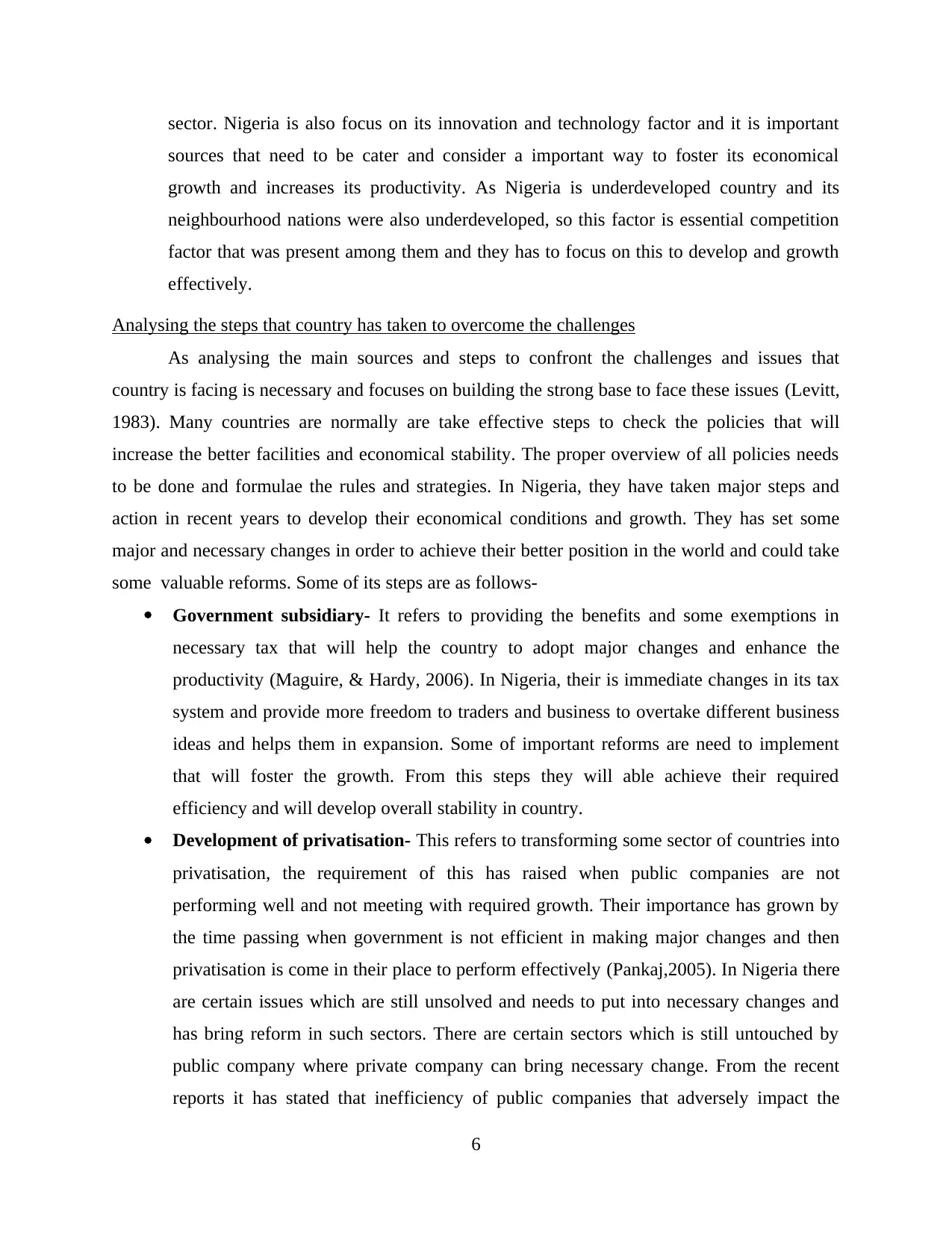
sector. Nigeria is also focus on its innovation and technology factor and it is important
sources that need to be cater and consider a important way to foster its economical
growth and increases its productivity. As Nigeria is underdeveloped country and its
neighbourhood nations were also underdeveloped, so this factor is essential competition
factor that was present among them and they has to focus on this to develop and growth
effectively.
Analysing the steps that country has taken to overcome the challenges
As analysing the main sources and steps to confront the challenges and issues that
country is facing is necessary and focuses on building the strong base to face these issues (Levitt,
1983). Many countries are normally are take effective steps to check the policies that will
increase the better facilities and economical stability. The proper overview of all policies needs
to be done and formulae the rules and strategies. In Nigeria, they have taken major steps and
action in recent years to develop their economical conditions and growth. They has set some
major and necessary changes in order to achieve their better position in the world and could take
some valuable reforms. Some of its steps are as follows-
Government subsidiary- It refers to providing the benefits and some exemptions in
necessary tax that will help the country to adopt major changes and enhance the
productivity (Maguire, & Hardy, 2006). In Nigeria, their is immediate changes in its tax
system and provide more freedom to traders and business to overtake different business
ideas and helps them in expansion. Some of important reforms are need to implement
that will foster the growth. From this steps they will able achieve their required
efficiency and will develop overall stability in country.
Development of privatisation- This refers to transforming some sector of countries into
privatisation, the requirement of this has raised when public companies are not
performing well and not meeting with required growth. Their importance has grown by
the time passing when government is not efficient in making major changes and then
privatisation is come in their place to perform effectively (Pankaj,2005). In Nigeria there
are certain issues which are still unsolved and needs to put into necessary changes and
has bring reform in such sectors. There are certain sectors which is still untouched by
public company where private company can bring necessary change. From the recent
reports it has stated that inefficiency of public companies that adversely impact the
6
sources that need to be cater and consider a important way to foster its economical
growth and increases its productivity. As Nigeria is underdeveloped country and its
neighbourhood nations were also underdeveloped, so this factor is essential competition
factor that was present among them and they has to focus on this to develop and growth
effectively.
Analysing the steps that country has taken to overcome the challenges
As analysing the main sources and steps to confront the challenges and issues that
country is facing is necessary and focuses on building the strong base to face these issues (Levitt,
1983). Many countries are normally are take effective steps to check the policies that will
increase the better facilities and economical stability. The proper overview of all policies needs
to be done and formulae the rules and strategies. In Nigeria, they have taken major steps and
action in recent years to develop their economical conditions and growth. They has set some
major and necessary changes in order to achieve their better position in the world and could take
some valuable reforms. Some of its steps are as follows-
Government subsidiary- It refers to providing the benefits and some exemptions in
necessary tax that will help the country to adopt major changes and enhance the
productivity (Maguire, & Hardy, 2006). In Nigeria, their is immediate changes in its tax
system and provide more freedom to traders and business to overtake different business
ideas and helps them in expansion. Some of important reforms are need to implement
that will foster the growth. From this steps they will able achieve their required
efficiency and will develop overall stability in country.
Development of privatisation- This refers to transforming some sector of countries into
privatisation, the requirement of this has raised when public companies are not
performing well and not meeting with required growth. Their importance has grown by
the time passing when government is not efficient in making major changes and then
privatisation is come in their place to perform effectively (Pankaj,2005). In Nigeria there
are certain issues which are still unsolved and needs to put into necessary changes and
has bring reform in such sectors. There are certain sectors which is still untouched by
public company where private company can bring necessary change. From the recent
reports it has stated that inefficiency of public companies that adversely impact the
6
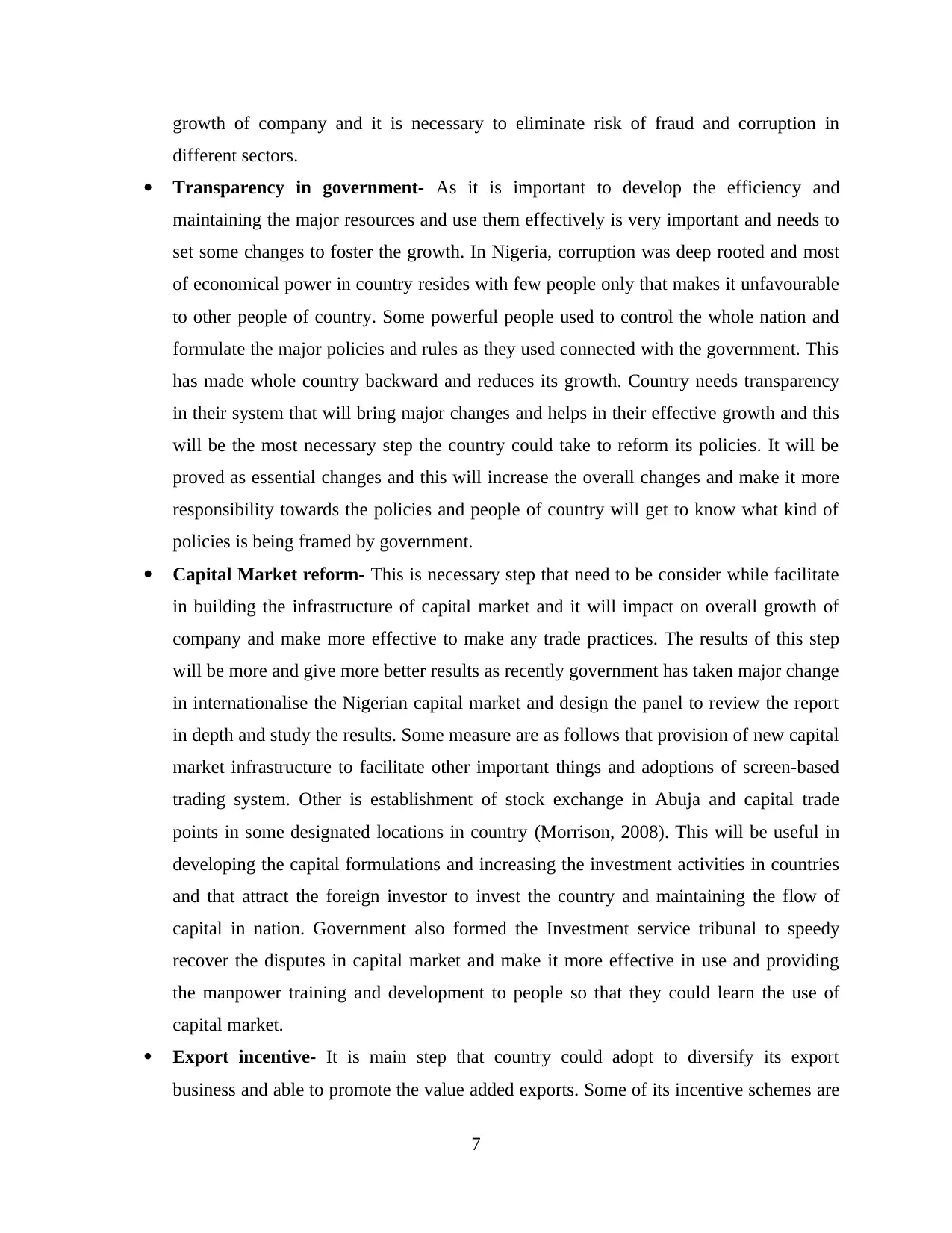
growth of company and it is necessary to eliminate risk of fraud and corruption in
different sectors.
Transparency in government- As it is important to develop the efficiency and
maintaining the major resources and use them effectively is very important and needs to
set some changes to foster the growth. In Nigeria, corruption was deep rooted and most
of economical power in country resides with few people only that makes it unfavourable
to other people of country. Some powerful people used to control the whole nation and
formulate the major policies and rules as they used connected with the government. This
has made whole country backward and reduces its growth. Country needs transparency
in their system that will bring major changes and helps in their effective growth and this
will be the most necessary step the country could take to reform its policies. It will be
proved as essential changes and this will increase the overall changes and make it more
responsibility towards the policies and people of country will get to know what kind of
policies is being framed by government.
Capital Market reform- This is necessary step that need to be consider while facilitate
in building the infrastructure of capital market and it will impact on overall growth of
company and make more effective to make any trade practices. The results of this step
will be more and give more better results as recently government has taken major change
in internationalise the Nigerian capital market and design the panel to review the report
in depth and study the results. Some measure are as follows that provision of new capital
market infrastructure to facilitate other important things and adoptions of screen-based
trading system. Other is establishment of stock exchange in Abuja and capital trade
points in some designated locations in country (Morrison, 2008). This will be useful in
developing the capital formulations and increasing the investment activities in countries
and that attract the foreign investor to invest the country and maintaining the flow of
capital in nation. Government also formed the Investment service tribunal to speedy
recover the disputes in capital market and make it more effective in use and providing
the manpower training and development to people so that they could learn the use of
capital market.
Export incentive- It is main step that country could adopt to diversify its export
business and able to promote the value added exports. Some of its incentive schemes are
7
different sectors.
Transparency in government- As it is important to develop the efficiency and
maintaining the major resources and use them effectively is very important and needs to
set some changes to foster the growth. In Nigeria, corruption was deep rooted and most
of economical power in country resides with few people only that makes it unfavourable
to other people of country. Some powerful people used to control the whole nation and
formulate the major policies and rules as they used connected with the government. This
has made whole country backward and reduces its growth. Country needs transparency
in their system that will bring major changes and helps in their effective growth and this
will be the most necessary step the country could take to reform its policies. It will be
proved as essential changes and this will increase the overall changes and make it more
responsibility towards the policies and people of country will get to know what kind of
policies is being framed by government.
Capital Market reform- This is necessary step that need to be consider while facilitate
in building the infrastructure of capital market and it will impact on overall growth of
company and make more effective to make any trade practices. The results of this step
will be more and give more better results as recently government has taken major change
in internationalise the Nigerian capital market and design the panel to review the report
in depth and study the results. Some measure are as follows that provision of new capital
market infrastructure to facilitate other important things and adoptions of screen-based
trading system. Other is establishment of stock exchange in Abuja and capital trade
points in some designated locations in country (Morrison, 2008). This will be useful in
developing the capital formulations and increasing the investment activities in countries
and that attract the foreign investor to invest the country and maintaining the flow of
capital in nation. Government also formed the Investment service tribunal to speedy
recover the disputes in capital market and make it more effective in use and providing
the manpower training and development to people so that they could learn the use of
capital market.
Export incentive- It is main step that country could adopt to diversify its export
business and able to promote the value added exports. Some of its incentive schemes are
7
⊘ This is a preview!⊘
Do you want full access?
Subscribe today to unlock all pages.

Trusted by 1+ million students worldwide
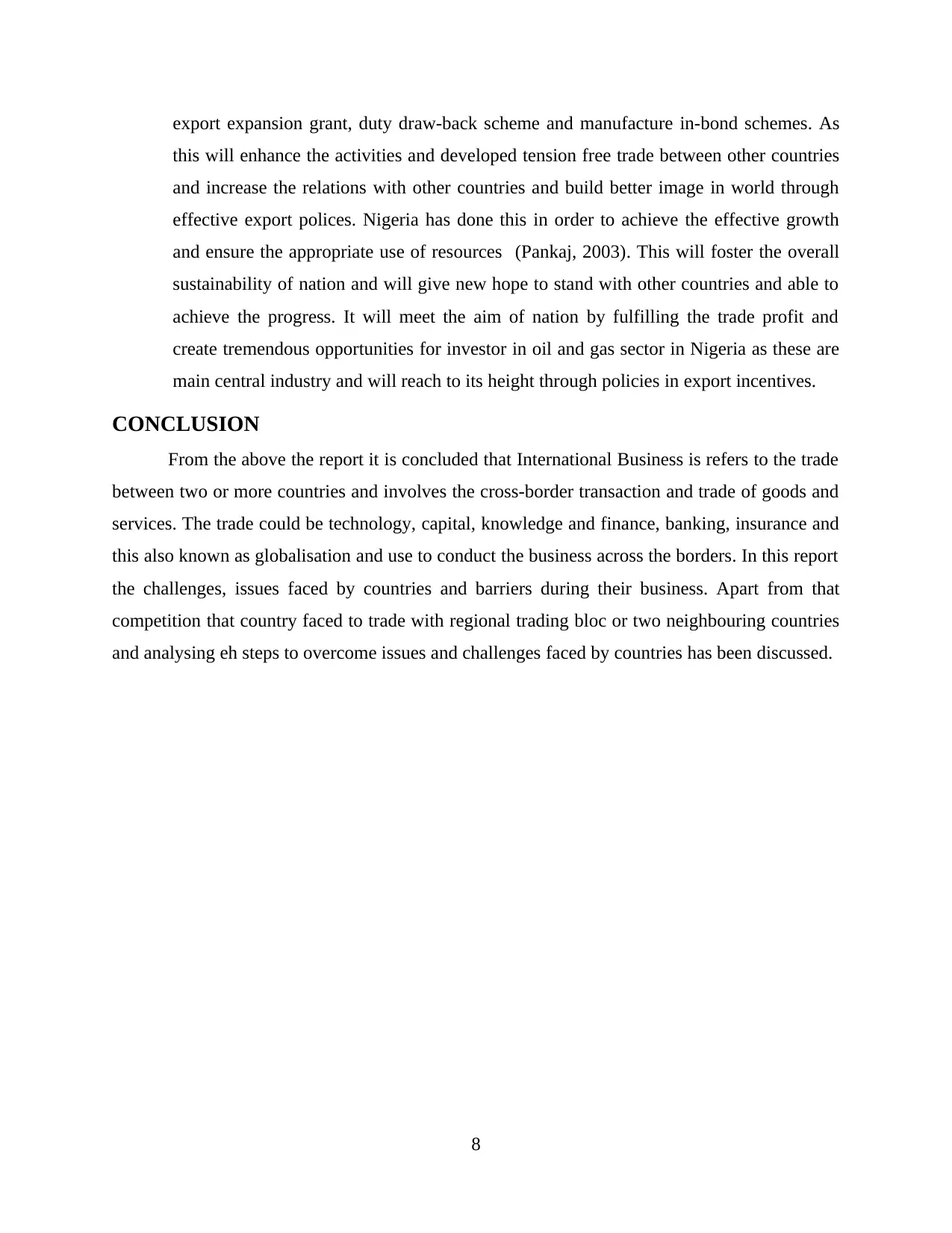
export expansion grant, duty draw-back scheme and manufacture in-bond schemes. As
this will enhance the activities and developed tension free trade between other countries
and increase the relations with other countries and build better image in world through
effective export polices. Nigeria has done this in order to achieve the effective growth
and ensure the appropriate use of resources (Pankaj, 2003). This will foster the overall
sustainability of nation and will give new hope to stand with other countries and able to
achieve the progress. It will meet the aim of nation by fulfilling the trade profit and
create tremendous opportunities for investor in oil and gas sector in Nigeria as these are
main central industry and will reach to its height through policies in export incentives.
CONCLUSION
From the above the report it is concluded that International Business is refers to the trade
between two or more countries and involves the cross-border transaction and trade of goods and
services. The trade could be technology, capital, knowledge and finance, banking, insurance and
this also known as globalisation and use to conduct the business across the borders. In this report
the challenges, issues faced by countries and barriers during their business. Apart from that
competition that country faced to trade with regional trading bloc or two neighbouring countries
and analysing eh steps to overcome issues and challenges faced by countries has been discussed.
8
this will enhance the activities and developed tension free trade between other countries
and increase the relations with other countries and build better image in world through
effective export polices. Nigeria has done this in order to achieve the effective growth
and ensure the appropriate use of resources (Pankaj, 2003). This will foster the overall
sustainability of nation and will give new hope to stand with other countries and able to
achieve the progress. It will meet the aim of nation by fulfilling the trade profit and
create tremendous opportunities for investor in oil and gas sector in Nigeria as these are
main central industry and will reach to its height through policies in export incentives.
CONCLUSION
From the above the report it is concluded that International Business is refers to the trade
between two or more countries and involves the cross-border transaction and trade of goods and
services. The trade could be technology, capital, knowledge and finance, banking, insurance and
this also known as globalisation and use to conduct the business across the borders. In this report
the challenges, issues faced by countries and barriers during their business. Apart from that
competition that country faced to trade with regional trading bloc or two neighbouring countries
and analysing eh steps to overcome issues and challenges faced by countries has been discussed.
8
Paraphrase This Document
Need a fresh take? Get an instant paraphrase of this document with our AI Paraphraser
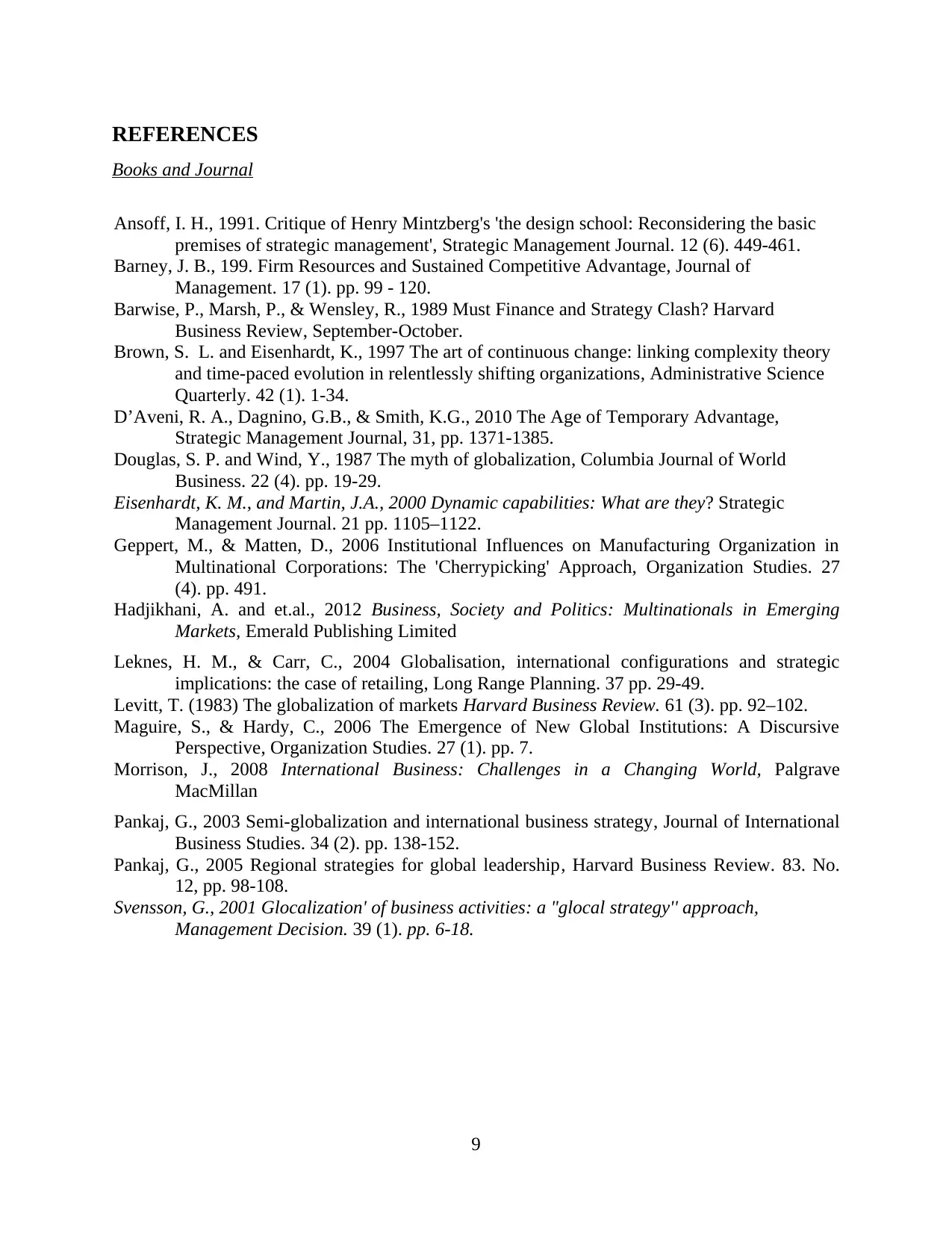
REFERENCES
Books and Journal
Ansoff, I. H., 1991. Critique of Henry Mintzberg's 'the design school: Reconsidering the basic
premises of strategic management', Strategic Management Journal. 12 (6). 449-461.
Barney, J. B., 199. Firm Resources and Sustained Competitive Advantage, Journal of
Management. 17 (1). pp. 99 - 120.
Barwise, P., Marsh, P., & Wensley, R., 1989 Must Finance and Strategy Clash? Harvard
Business Review, September-October.
Brown, S. L. and Eisenhardt, K., 1997 The art of continuous change: linking complexity theory
and time-paced evolution in relentlessly shifting organizations, Administrative Science
Quarterly. 42 (1). 1-34.
D’Aveni, R. A., Dagnino, G.B., & Smith, K.G., 2010 The Age of Temporary Advantage,
Strategic Management Journal, 31, pp. 1371-1385.
Douglas, S. P. and Wind, Y., 1987 The myth of globalization, Columbia Journal of World
Business. 22 (4). pp. 19-29.
Eisenhardt, K. M., and Martin, J.A., 2000 Dynamic capabilities: What are they? Strategic
Management Journal. 21 pp. 1105–1122.
Geppert, M., & Matten, D., 2006 Institutional Influences on Manufacturing Organization in
Multinational Corporations: The 'Cherrypicking' Approach, Organization Studies. 27
(4). pp. 491.
Hadjikhani, A. and et.al., 2012 Business, Society and Politics: Multinationals in Emerging
Markets, Emerald Publishing Limited
Leknes, H. M., & Carr, C., 2004 Globalisation, international configurations and strategic
implications: the case of retailing, Long Range Planning. 37 pp. 29-49.
Levitt, T. (1983) The globalization of markets Harvard Business Review. 61 (3). pp. 92–102.
Maguire, S., & Hardy, C., 2006 The Emergence of New Global Institutions: A Discursive
Perspective, Organization Studies. 27 (1). pp. 7.
Morrison, J., 2008 International Business: Challenges in a Changing World, Palgrave
MacMillan
Pankaj, G., 2003 Semi-globalization and international business strategy, Journal of International
Business Studies. 34 (2). pp. 138-152.
Pankaj, G., 2005 Regional strategies for global leadership, Harvard Business Review. 83. No.
12, pp. 98-108.
Svensson, G., 2001 Glocalization' of business activities: a "glocal strategy'' approach,
Management Decision. 39 (1). pp. 6-18.
9
Books and Journal
Ansoff, I. H., 1991. Critique of Henry Mintzberg's 'the design school: Reconsidering the basic
premises of strategic management', Strategic Management Journal. 12 (6). 449-461.
Barney, J. B., 199. Firm Resources and Sustained Competitive Advantage, Journal of
Management. 17 (1). pp. 99 - 120.
Barwise, P., Marsh, P., & Wensley, R., 1989 Must Finance and Strategy Clash? Harvard
Business Review, September-October.
Brown, S. L. and Eisenhardt, K., 1997 The art of continuous change: linking complexity theory
and time-paced evolution in relentlessly shifting organizations, Administrative Science
Quarterly. 42 (1). 1-34.
D’Aveni, R. A., Dagnino, G.B., & Smith, K.G., 2010 The Age of Temporary Advantage,
Strategic Management Journal, 31, pp. 1371-1385.
Douglas, S. P. and Wind, Y., 1987 The myth of globalization, Columbia Journal of World
Business. 22 (4). pp. 19-29.
Eisenhardt, K. M., and Martin, J.A., 2000 Dynamic capabilities: What are they? Strategic
Management Journal. 21 pp. 1105–1122.
Geppert, M., & Matten, D., 2006 Institutional Influences on Manufacturing Organization in
Multinational Corporations: The 'Cherrypicking' Approach, Organization Studies. 27
(4). pp. 491.
Hadjikhani, A. and et.al., 2012 Business, Society and Politics: Multinationals in Emerging
Markets, Emerald Publishing Limited
Leknes, H. M., & Carr, C., 2004 Globalisation, international configurations and strategic
implications: the case of retailing, Long Range Planning. 37 pp. 29-49.
Levitt, T. (1983) The globalization of markets Harvard Business Review. 61 (3). pp. 92–102.
Maguire, S., & Hardy, C., 2006 The Emergence of New Global Institutions: A Discursive
Perspective, Organization Studies. 27 (1). pp. 7.
Morrison, J., 2008 International Business: Challenges in a Changing World, Palgrave
MacMillan
Pankaj, G., 2003 Semi-globalization and international business strategy, Journal of International
Business Studies. 34 (2). pp. 138-152.
Pankaj, G., 2005 Regional strategies for global leadership, Harvard Business Review. 83. No.
12, pp. 98-108.
Svensson, G., 2001 Glocalization' of business activities: a "glocal strategy'' approach,
Management Decision. 39 (1). pp. 6-18.
9
1 out of 11
Related Documents
Your All-in-One AI-Powered Toolkit for Academic Success.
+13062052269
info@desklib.com
Available 24*7 on WhatsApp / Email
![[object Object]](/_next/static/media/star-bottom.7253800d.svg)
Unlock your academic potential
Copyright © 2020–2026 A2Z Services. All Rights Reserved. Developed and managed by ZUCOL.


